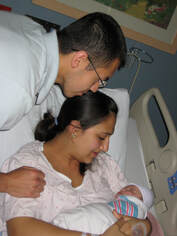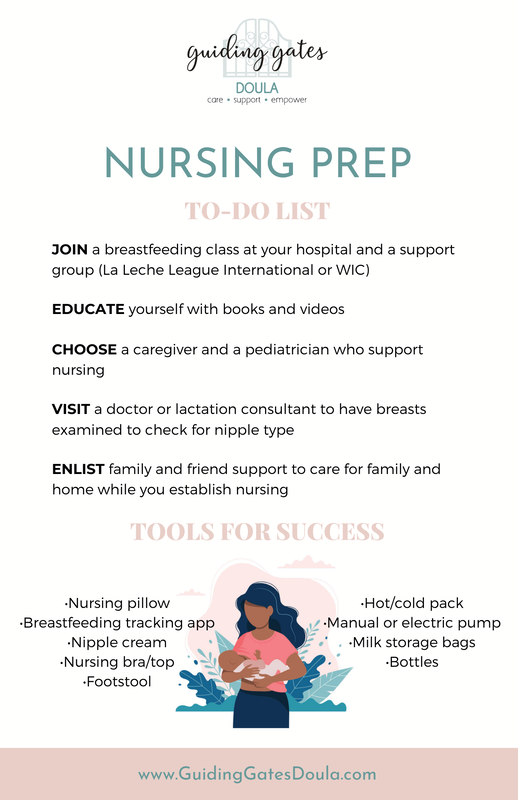|
You're almost there, but don't quit just yet! You did great on that birth plan but have you planned for the "after" time? Also known as the fourth trimester, the twelve weeks after baby's birth is a period of growth, change, and adjustment for parents and baby. It's no secret babies require lots of time and attention from both parents while they're running on little sleep. This can make some new parents pretty overwhelmed and make it harder to make decisions, find time for themselves, or feel like they're nailing it.
To prevent feeling underprepared, many experts recommend crafting a postpartum plan that can help you transition into parenthood and identify helpful resources before you need them. You don't need to literally write one up, but you should discuss important questions with your partner, such as household responsibilities, newborn care, intimacy, and visitor policy. Just as with a birth plan, your postpartum period may not go according to plan, but it will help you feel prepared to make decisions and make clear how you envision the first few months after giving birth. Click here for a printable postpartum worksheet and scroll down. The Five Mistakes I Made Giving Birth
Almost fourteen years ago, my husband and I carefully crafted the birth plan for our first child. We attended the 12-week Bradley Method course, read What to Expect When You're Expecting, and Ina May Gaskin's Guide to Childbirth. In my last trimester, I began attending La Leche League meetings and my baby's nursery was stocked and ready for her. On paper, we were prepared, informed, and diligent. We deserved a good birth experience. We were sorely mistaken and looking back at the plan I had saved on my Google Drive only reminds me of how poorly prepared we were. Sure, my plan detailed what I wanted to avoid, how I would labor, and the newborn procedures we preferred. It all checked out...it was easy to read and even buttered up the hospital staff. The goal: healthy mom and baby. Who doesn't want that?
Me. I wanted more.
If I could redo my births, I'd do them at home! But alas, I was young and uninformed. It goes like this: You're pregnant, you see an OB, and you deliver at a hospital, right? Well, I sure wish someone had told me I was an excellent candidate for home birth and that I didn't need to be a hippie to give it a try. In fact, home births and the use of midwives are on the rise but only 1% of births are at home.
The benefits of home birth appeal to many first-time and repeat moms, including those seeking to avoid a repeat C-section. But a home birth is not for everyone and it requires more preparation and responsibility from the parents. No nurse interrupting your laser focus with her monitoring and cervical exams? No time restraints or restrictions on movement or nourishment? No nurse waking you every few hours after you've had baby? Trust me, sleep is hella precious after birth! Less risk of infection and use of forceps and C-section? SIGN ME UP, LIKE YESTERDAY! Still unsure? Read on to calm those doubts.
I'll admit it, there's something about being in a hospital or doctor's office that just makes you want to say "yes" to everything and question your God-given intuition. But you CAN speak up, ask questions, get second opinions, ask for more time, or just say "NO!"
Having a doula who can educate you on the possible procedures and interventions is a great way of using knowledge to your advantage. She can let you know if you can opt out of something that doesn't sit right with you, help you start a conversation with your provider, give you unbiased info on the topic, and provide you with alternatives so that you can choose what's best. Not many women know they can refuse cervical checks, routine IV fluids, membrane sweep, breaking your water, some monitoring, induction if mom and baby are healthy, unnecessary C-sections, and ultrasounds for non-medical reasons. That's why having a doula can be so valuable. She can clearly see through scare tactics and practices that aren't suited for you. TIPS FOR SUCCESS •Create a birth plan and have a conversation with your provider regarding your wishes and how they can support it •Understand possible procedures/interventions and identify the ones you're not ok with (unless necessary) ahead of time •Providers are legally required to tell you the possible benefits and risks of any procedure, so ask before agreeing to anything •You have the right to decline any intervention or medication that you don't agree with, although it's best to consider the benefits and risks •Your autonomy needs to be respected and you have the right to informed refusal...but the doctor also has the right to disagree to provide care you may request Click here to learn more about informed consent. How I Turned My Fascination Into a Paying Passion
Fourteen years ago, I was in my second trimester with my first child. I had the usual mix of excitement and worry that most new moms felt, but I decided to silence those fears by educating myself...and I wasn't going to do it alone. With my husband by my side, we decided to take a Bradley Method of Childbirth course which consisted of weekly 3-hour classes with other pregnant couples. What unexpectedly happened was that I developed a fascination for childbirth. Labor was not what I expected. My birth plan was just silly wishing and I was left feeling a bit regretful about how things played out. But in the newness of being a mom and having a perfectly healthy baby girl, I had no time to dwell or revel in what had happened. My sister had made the five-hour drive to be at the hospital with us. She brought peace and love with her and I vividly remember her picking up my hair as if she could read my mind.
One year later, I was living with that same sister and her husband who were expecting their first child. They had also taken the Bradley Method and understood the importance of having support. I was happy to fill that role. She began to labor late in the evening and, after packing last-minute items into the hospital bag, we transitioned to the hospital. I was in disbelief that I was about to witness a child be born. I did what I could to keep her comfortable. I had no training and no experience, but I loved her so much and knew that love would show. During the hours I was there, I felt no hunger, thirst, or exhaustion. I stayed the whole night. I came home the following morning after the birth, in somewhat of a shock, and went back to being the mom of a toddler. I looked at my sweet girl's face and realized that I had also gone through such a life-changing experience. I remembered that I had once roared with power like my sister. What to Bring to the Hospital Without Overdoing it
Great news! Hospital births are so much more accommodating than they were 20 years ago. Gone are the days of cold, sterile rooms with little to help parents feel at home. These days, labor rooms are equipped with comfy beds that move into all sorts of positions and can accommodate stirrups and a squat bar. Most rooms also include T.V.s, music players, birth balls, dimmable lighting, a space for partners to spend the night, and a few even have birth tubs. Mom can expect to receive postpartum pads, padsicles (frozen pads to help with swelling), disposable mesh underwear, and a breast pump to borrow. Baby will have diapers, wipes, bottles, a pacifier (if allowed), and hospital clothing. No need to fret and overpack a hospital bag!
So what exactly do you NEED to bring?
I also recommend you choose the right bag/suitcase for your items. Find one that has plenty of compartments and store things according to when you'll need them or by purpose (labor, toiletries, postpartum, nursing) so you don't have to rifle through the bag and make a mess. Large zip bags make organizing much easier! How to Get Your Partner on Board With a Doula
Let's be real, it takes a village to raise a child AND to bring one into this world!
You've likely imagined your doula, partner, and birth team working in harmony as you labor but now you're faced with the possibility of it being a tension-riddled situation instead because your partner doesn't want a doula. But you've done your homework and you're convinced you must have one. So how do you fix this? Well, the majority of reluctant partners come from a place of love and concern. They want to protect you, keep the experience personal and sacred, and be the one you turn to for support. These are all excellent reasons to be there for you and convincing them to allow an extra person in this special moment is no small feat. Fortunately, with a little guidance, you can tip the odds in your favor. Tips for Successful NursingSurprisingly, something so natural doesn't come naturally to many of us!
|
Archives
February 2024
Categories
All
|
|
Guiding Gates Doula LLC
|
(719) 428-6929
|
Hampton • Norfolk • Williamsburg • Yorktown • Newport News • Smithfield







 RSS Feed
RSS Feed